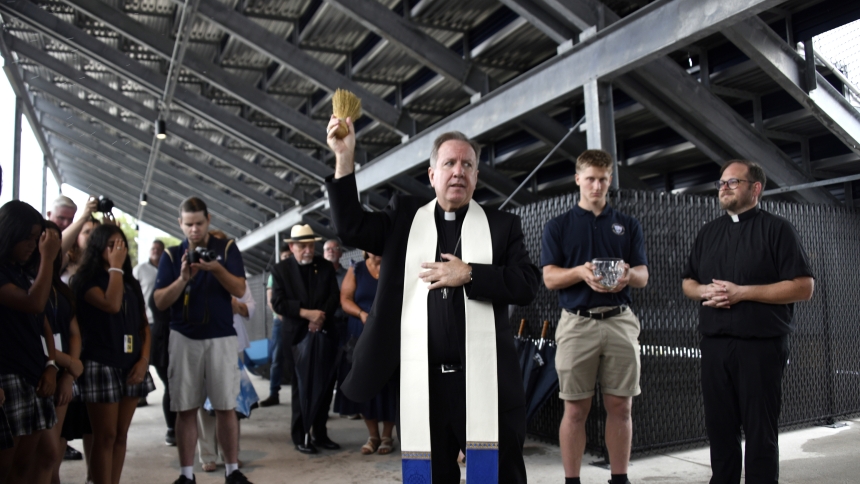
As Labor Day weekend is upon us, it’s good to reflect more deeply on the meaning of our work. Many people see work as drudgery and impediments to what we might otherwise want to do. In fact, it was not always so. From the beginning, God endowed us with creative capacities. God “worked” in the act of creation and then gave a day of rest. After the fall of Adam and Eve in the garden, work became drudgery as a consequence of that original sin.
However, as we reflect upon Labor Day, we can seek to reclaim the true meaning of work. The Hebrew word for work means to cultivate, to transform one’s surroundings, to impact the world around us. When we work, we have an opportunity to participate in God’s creative action.
Jesus himself worked, as Pope Francis wrote in his 2015 encyclical Laudato si‘:
Jesus worked with his hands, in daily contact with the matter created by God, to which he gave form by his craftsmanship. It is striking that most of his life was dedicated to this task in a simple life which awakened no admiration at all: “Is not this the carpenter, the son of Mary?” (Mark 6:3) (98).
The Catechism of the Catholic Church reminds us:
Human work proceeds directly from persons created in the image of God and called to prolong the work of creation by subduing the earth, both with and for one another. Hence work is a duty: "If any one will not work, let him not eat." Work honors the Creator's gifts and the talents received from him. It can also be redemptive. By enduring the hardship of work in union with Jesus, the carpenter of Nazareth and the one crucified on Calvary, man collaborates in a certain fashion with the Son of God in his redemptive work. He shows himself to be a disciple of Christ by carrying the cross, daily, in the work he is called to accomplish. Work can be a means of sanctification and a way of animating earthly realities with the Spirit of Christ. (CCC 2427)
We fulfill our potential in work and have a means to provide for ourselves and others. The Catechism also reminds us of the right to economic initiative, that we should be free to us our talents and harvest the fruits of our labors:
In work, the person exercises and fulfills in part the potential inscribed in his nature. The primordial value of labor stems from man himself, its author and its beneficiary. Work is for man, not man for work. Everyone should be able to draw from work the means of providing for his life and that of his family, and of serving the human community.
Everyone has the right of economic initiative; everyone should make legitimate use of his talents to contribute to the abundance that will benefit all and to harvest the just fruits of his labor. He should seek to observe regulations issued by legitimate authority for the sake of the common good. (CCC 2428-2429)
Whatever our trade, profession or calling may be, my prayer is that we find deeper meaning in our labors.Let’s also pray for those who are unemployed or underemployed that they may find meaningful work and be able to provide for themselves and their families.
Enjoy some rest this Labor Day weekend.
Your servant,
Most Reverend Robert J. McClory
Bishop
Diocese of Gary
El significado más profundo del trabajo
Ahora que se llega el fin de semana del Día del Trabajo, es bueno reflexionar a un nivel más profundo sobre el significado de nuestro trabajo. Mucha gente ve el trabajo como una pesadez y un impedimento para lo que realmente nos gustaría hacer. En realidad, no siempre fue así. Desde el principio, Dios nos dotó de capacidades creativas.Dios "trabajó" en el acto de la creación y luego dio un día de descanso. Tras la caída de Adán y Eva en el jardín, el trabajo se convirtió en un trabajo arduo y monótono como consecuencia del pecado original.
Sin embargo, al reflexionar sobre el Día del Trabajo, podemos tratar de recuperar el verdadero significado del trabajo. La palabra hebrea para trabajo significa cultivar, transformar el entorno, influir en el mundo que nos rodea. Cuando trabajamos, tenemos la oportunidad de participar en la acción creadora de Dios.
Jesús mismo trabajó, como escribió el Papa Francisco en su encíclica Laudato si' del 2015:
Jesús trabajaba con sus manos, tomando contacto cotidiano con la materia creada por Dios para darle forma con su habilidad de artesano. Llama la atención que la mayor parte de su vida fue consagrada a esa tarea, en una existencia sencilla que no despertaba admiración alguna: «¿No es este el carpintero, el hijo de María?» (Mc 6, 3) (98).
El Catecismo de la Iglesia Católica nos lo recuerda:
El trabajo humano procede directamente de personas creadas a imagen de Dios y llamadas a prolongar, unidas y para mutuo beneficio, la obra de la creación dominando la tierra (cf Gn 1, 28; GS 34; CA 31). El trabajo es, por tanto, un deber: “Si alguno no quiere trabajar, que tampoco coma” (2 Ts 3, 10; cf 1 Ts 4, 11). El trabajo honra los dones del Creador y los talentos recibidos. Puede ser también redentor. Soportando el peso del trabajo (cf Gn 3, 14-19), en unión con Jesús, el carpintero de Nazaret y el crucificado del Calvario, el hombre colabora en cierta manera con el Hijo de Dios en su obra redentora. Se muestra como discípulo de Cristo llevando la Cruz cada día, en la actividad que está llamado a realizar (cf LE 27). El trabajo puede ser un medio de santificación y de animación de las realidades terrenas en el espíritu de Cristo. (CIC 2427)
Realizamos nuestro potencial en el trabajo y disponemos de medios para mantenernos a nosotros mismos y a los demás. El Catecismo también nos recuerda el derecho a la iniciativa económica, que debemos ser libres para utilizar nuestros talentos y recoger los frutos de nuestro trabajo:
En el trabajo, la persona ejerce y aplica una parte de las capacidades inscritas en su naturaleza. El valor primordial del trabajo pertenece al hombre mismo, que es su autor y su destinatario. El trabajo es para el hombre y no el hombre para el trabajo (cf LE 6).
Cada cual debe poder sacar del trabajo los medios para sustentar su vida y la de los suyos, y para prestar servicio a la comunidad humana.
Cada uno tiene el derecho de iniciativa económica, y podrá usar legítimamente de sus talentos para contribuir a una abundancia provechosa para todos y para recoger los justos frutos de sus esfuerzos. Deberá ajustarse a las reglamentaciones dictadas por las autoridades legítimas con miras al bien común (cf CA 32-34). (CCC 2428-2429)
Sea cual sea nuestro oficio, profesión o vocación, rezo para que encontremos un sentido más profundo a nuestra labor.Recemos también por los desempleados o subempleados, para que encuentren un trabajo significativo y puedan mantenerse a sí mismos y a sus familias.
Disfrute del descanso este fin de semana del Día del Trabajo.
Su servidor,
Reverendísimo Robert J. McClory
Obispo
Diócesis de Gary



